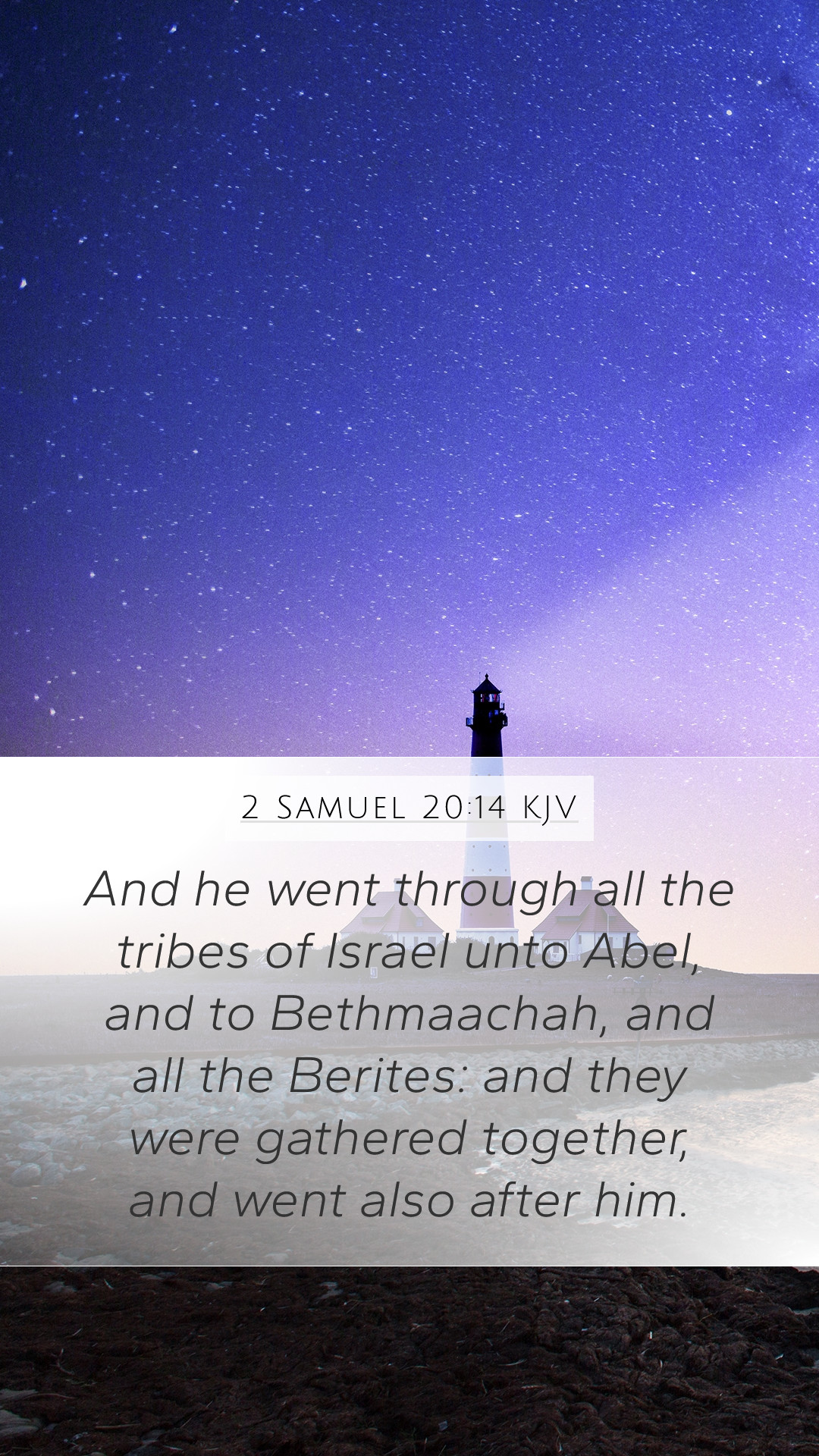The Meaning of 2 Samuel 20:14: A Comprehensive Bible Verse Commentary
Introduction
In 2 Samuel 20:14, we encounter a pivotal moment in the narrative surrounding King David's reign. This verse illustrates the dynamics of leadership, rebellion, and the quest for justice within the complex political landscape of ancient Israel. Below, we provide a detailed analysis of this verse using insights from esteemed public domain commentaries to enhance your understanding and interpretation of the Scripture.
Verse Text
“And he went through all the tribes of Israel unto Abel, and to Beth-maachah, and all the Berites: and they were gathered together, and went also after him.” (2 Samuel 20:14, KJV)
Contextual Overview
The events in 2 Samuel unfold during a tumultuous time in Israel's history. Following the rebellion of Absalom, David returns to reclaim his throne, only to face new challenges from Sheba, the son of Bichri, who incites further discontent among the tribes of Israel.
Key Figures and Settings
- David: The king seeking control and stability.
- Sheba: A rebel inciting division.
- Abel and Beth-maachah: Towns that become focal points in the conflict.
- The Berites: A group that aligns with Sheba.
Commentary Insights
Matthew Henry's Commentary
Matthew Henry emphasizes the swiftness of David's response to the rebellion of Sheba. He notes that David's demand for justice and authority showcases the necessity of a ruler to address sedition with determination. The mobilization of the people illustrates their allegiance to the king and the communal desire for peace.
Albert Barnes' Notes
Albert Barnes highlights the geographical significance of the towns mentioned. Abel of Beth-maachah is recognized as a strategic location, revealing the realpolitik in play. Barnes points out that the gathering of forces against Sheba represents a united front of Israelites, demonstrating the consensus on the need to eliminate rebellion for the sake of national integrity.
Adam Clarke's Commentary
Adam Clarke focuses on the community's response to David’s call. He signifies the loyalty of the tribes, where despite internal strife, collective action is pursued against a common enemy. Clarke elaborates on the symbolic meaning of coming together, indicating that when leaders unite their followers for a righteous cause, it strengthens both governance and societal ties.
Applications and Reflections
Understanding this verse allows for deep reflection on leadership and unity in the face of division. It offers insights into how communities can come together to address challenges, emphasizing the importance of a decisive leader willing to act for the greater good.
Leadership Lessons
- Decisiveness: Leaders must act quickly in the face of threats.
- Unity: Cohesion among followers is critical for overcoming obstacles.
- Accountability: A leader must ensure justice prevails within the community.
Spiritual Applications
The spiritual takeaways from this passage include:
- Following Righteous Leadership: Believers are called to support leaders who champion justice and peace.
- Being Vigilant: It encourages vigilance against rebellion not just in a physical sense but also in matters of faith and community.
- Community Action: Engaging in communal efforts to rectify wrongs underlies the Christian principle of loving one's neighbor.
Related Cross References
- 2 Samuel 16:21-22: Discusses David's responses to Absalom and the challenges faced during his kingship.
- 1 Kings 2:5: References to the consequences of rebellion within the monarchy.
- Acts 15:25: Highlights the importance of unity in the early church, paralleling the themes of communal action.
Conclusion
2 Samuel 20:14 serves as a reminder of the significance of unity and decisive action within a community led by just leaders. By understanding this verse through various commentaries, believers can gain valuable insights applicable to both personal faith and community involvement.
Further Study Resources
For those interested in diving deeper, consider utilizing several Bible study tools and resources available online:
- Bible Study Guides: Detailed guides to help navigate complex Scriptures.
- Online Bible Study Groups: Community discussions to enhance understanding.
- Bible Study Lessons: Structured lessons focused on specific passages and themes.


